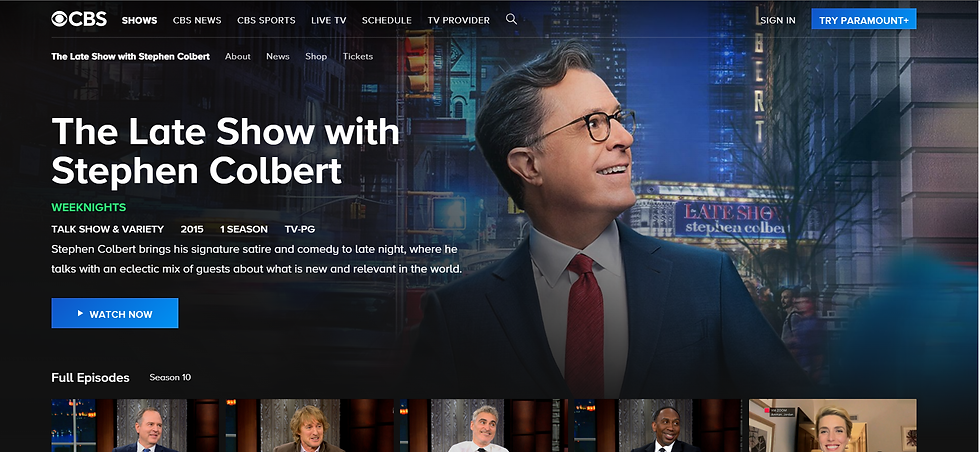Too little, too 'Late' - why CBS' rationale for ending The Late Show isn't landing.
- Mark Campbell

- Jul 21, 2025
- 3 min read

Last week, Stephen Colbert not only announced that next year would be his last as host of CBS' The Late Show, but also that CBS was ending the show altogether.
CBS positioned it as a financial decision.
But there has been a lot of skepticism about that.
I mean, a lot.
And understandably so.
The news came mere days after Colbert skewered CBS and its parent company, Paramount, for paying what he termed a bribe to make a lawsuit from Donald Trump go away.
Paramount is in the midst of a $8-billion merger between the company and Skydance Media and needs FCC approval for this to be completed.
Colbert calling attention to the settlement, and terming it a bribe, doesn't likely help.
Nor would the fact that Colbert has been a sustained critic of the Trump administration.
Which is why, even with the show's ad revenues declining and viewership down, a general trend in late-night broadcasting, CBS' rationale isn't really landing.
The timing and the optics are working against them.
These are important considerations in any communications activity you undertake.
Specifically, is there anything occurring that will contradict or undermine the message you convey.
In CBS' case, there is.
Any other week in the year, I might have given their reasoning more weight.
In fact, when they opted not to continue After Midnight following Taylor Tomlinson's decision to walk away from the show to focus on her standup career, despite having renewed the show for a third year, it didn't scan as anything but another sign that broadcast television is struggling to remain relevant and profitable in the streaming era.
But making the announcement that both Colbert and the Late Show are effectively done on the same week that show decided to call out the settlement suggests CBS sees it, and its host, as a liability.
This has had several effects that could have long-lasting brand impacts for CBS.
For one, it undermines broadcaster's reputation as an authoritative and trustworthy source of news, even more so given the departure of 60 Minutes producer Bill Owens, who said he could no longer run the show as he saw fit.
His message was credible and well-timed, given that settlement talks were already in the air.
But it also will have impacts on CBS and even Paramount.
How many creatives are going to want to bring ideas to the network or the conglomerate if they think their vision will be compromised or cancelled because Paramount wants to make more concessions to federal regulators or wants to appease someone threatening them with a lawsuit?
And how many people will be willing to renew their Paramount+ subscriptions, watch a CBS show, or go to a Paramount movie based on their handling of Colbert?
The reputational damage to their brand may cost them more in the long run due to lost opportunities or cancellations than whatever gains they hope to make right now.
I may be overstating it.
I mean, this isn't the first time CBS was in a situation like this.
In the late 1960s, the network cancelled the Smothers Brothers show and claimed it was due to non-delivery of the show when the evidence clearly indicated they were uncomfortable with the pointed political and religious satirical content of that show.
The network survived that.
They'll likely survive this too.
But there will still be brand damage to deal with that could have been unavoidable.
This is a reminder that, for any announcement you plan to make, consider the timing and the events that are unfolding both around you and within your organization.
Ask yourself how likely it is that your narrative will be the prevailing one or be seen as credible.
If anything can compromise that, think of how you address that before you commit to putting it out there.
Because once you loose your reputation, you can't always buy it back.
Or pay millions of people to see things your way.
Count me among the skeptics.
Any other week in the year, I might have given CBS' reasoning more weight.
Particularly in light of their decision to cancel After Midnight when Taylor Tomlinson decided to walk away from the show to resume performing standup instead of finding a new host.
But in the wake of Colbert's monologue, it feels disingenuous.
Timing is everything.
And so are optics.
In this case, CBS' are both off because the events surrounding the announcement that Colbert is out and the show is ending




Comments